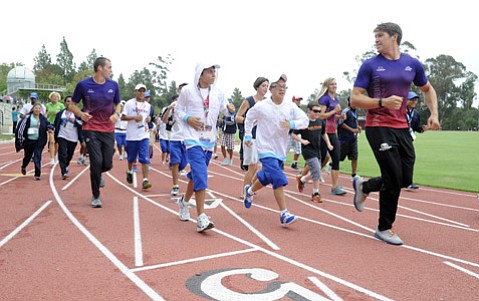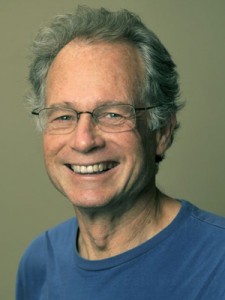
World-class athletes and coaches from Guatemala, Honduras, Nicaragua, and St. Kitts and Nevis practice for the 2015 Special Olympics World Games at Westmont College. (Paul Wellman Photo)
Santa Barbara did its part to roll out the welcome track — and the welcome pool — for athletes and coaches participating in the 2015 Special Olympics World Games now underway in Los Angeles. For several days preceding the opening ceremonies, Westmont College provided housing and facilities for delegations from four of the 165 participating nations: Guatemala, Honduras, Nicaragua, and St. Kitts and Nevis.
Despite transportation snafus that had some of them arriving after midnight, the visitors were full of good cheer when Mayor Helene Schneider greeted them with a “Bienvenidos” at the Westmont track last Wednesday morning. They ran a lap with members of the Santa Barbara Track Club, led by U.S. heptathlon champion Barbara Nwaba.
.
John Zant’s column appears
each week in the
Santa Barbara Independent
“Exercise helps them feel better,” said Violet Clarke, assistant head of the St. Kitts and Nevis delegation. Her team’s journey began at 4 a.m. Monday with a boat ride from Nevis to St. Kitts, the larger of the nation’s two islands, followed by flights to Miami and Los Angeles. After checking out of their L.A. hotel Tuesday, they waited six hours for a Santa Barbara shuttle to pick them up. Although a description of their nation’s customs states, “Tardiness is not considered rude,” that was a little hard to take. “We couldn’t move,” Clarke said.
St. Kitts and Nevis is in the middle of the Caribbean Sea. “It’s lush and green, the most beautiful island in the world,” said tennis coach Elton Hall. One of its claims to fame is that Alexander Hamilton was born on Nevis. “And now they want to take him off the $10 dollar bill,” Hall said jovially.
Resort hotels on the islands provided practice facilities for the Special Olympics athletes, such as a bocce court at the Four Seasons on Nevis and a pool at the Sugar Bay Club on St. Kitts. But the pool is small. “You have to go down and back to swim 25 meters,” said swimming coach Josephine Claxton-Richardson. She saw the Olympic-sized pool at Westmont and asked that it be opened up for her athletes. “They were excited about experiencing an Olympic pool,” she said. “It shows how much they care. It’s not a vacation.”
Javier Mejia of Honduras, entered in the open-water swim in L.A., was also able to practice for his event. Catharine Manset, co-chair of Santa Barbara’s Host City program, took him to East Beach for the Thursday-evening Reef & Run. Mejia did the first lap of 500 meters and wanted to continue. “I said okay, and he was very fine at the end of 1,000 meters,” said his coach, Isaac Valladares. “There’s no question in my mind he wouldn’t stop if I didn’t tell him.”
Other activities for the visitors included tours of the Museum of Natural History and the Santa Barbara Zoo, a dinner dance at the Cabrillo Arts Center, and a barbecue at Leadbetter Beach. “It has been great,” Valladares said. “All the people have been helping us. Everything is fine. There is nothing to complain about.”
Upward of 6,500 Special Olympians paraded Saturday night at the L.A. Coliseum, where they heard Michelle Obama announce, “Let the Games begin.” Only one athlete on the U.S. team, softball player LaMarcus Briggs, is from Santa Barbara. But the message of the World Games reaches every community where marginalized children and adults crave recognition and respect.
“It increases awareness and helps us in our effort to bring in young athletes and volunteers,” said Jerry Siegel, co-chair of the Host City program and also head of the Regional Leadership Council for Santa Barbara Special Olympics. The grassroots organization sponsors 11 sports, divided into fall and spring seasons, each with 12 weeks of training for Southern California competitions.
In an interview on ESPN before the World Games, founding family member Maria Shriver said too many people are afraid of the prospect of having a child with intellectual disabilities. Special Olympics serves to display their capabilities, she said: “People are shocked at what they are capable of, how competent they are, what great employees they are. We need to tell the story in a more open and aggressive way.”
A SPECIAL FAMILY: Gwendolyn Strong drew her last breath on July 25 after surviving — no, thriving — almost eight years with spinal muscular atrophy (SMA). Because her parents, Bill and Victoria Strong, were not afraid to deal with her condition, Gwendolyn herself was fearless. She participated fully in life. With her father’s leg power complementing her willpower, Gwendolyn rolled through the Santa Barbara Half Marathon for the third time last November. Among all the inspirational people who take on challenges in sports and life, the Strongs are in a class of their own.
A SPECIAL TEAM: The Santa Barbara Foresters head into the National Baseball Congress (NBC) World Series at Wichita, Kansas, this weekend after compiling the best regular-season record (35-7) in their 25-year history. Bill Pintard, their manager for the past 21 seasons, said this year’s collection of college ballplayers is “truly a special, special team.” The Foresters are defending NBC champions, having won their fifth title in nine years last summer. They are shooting for the record of six championships collected by the Fairbanks (Alaska) Goldpanners from 1972-2002. The tournament dates back to 1935, when Satchel Paige pitched Bismarck, North Dakota, to victory, striking out 60 batters in four games. Pintard joined Paige and many other baseball greats in the NBC Hall of Fame last year.


